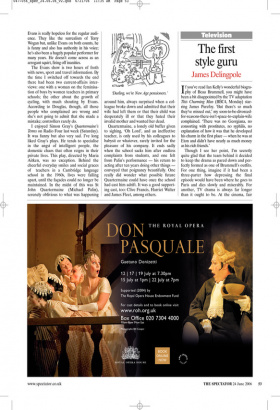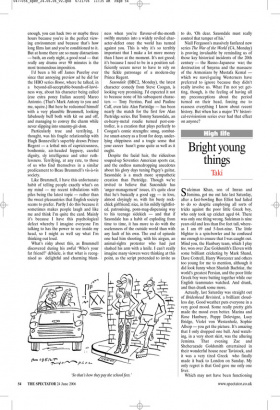The first style guru
James Delingpole
If you’ve read Ian Kelly’s wonderful biography of Beau Brummell, you might have been a bit disappointed by the TV adaptation This Charming Man (BBC4, Monday) starring James Purefoy. ‘But there’s so much they’ve missed out,’ my soon-to-be-divorcedfor-reasons-there-isn’t-space-to-explain-wife complained. ‘There was no Georgiana, no consorting with prostitutes, no syphilis, no explanation of how it was that he developed his charm in the first place — when he was at Eton and didn’t have nearly as much money as his rich friends.’ Though I see her point, I’m secretly quite glad that the team behind it decided to keep the drama as pared down and perfectly formed as one of Brummell’s outfits. For one thing, imagine if it had been a three-parter how depressing the final episode would have been where he goes to Paris and dies slowly and miserably. For another, TV drama is always far longer than it ought to be. At the cinema, fair enough, you can hack two or maybe three hours because you’re in the perfect viewing environment and because that’s how long films last and you’re conditioned to it. But at home there are so many distractions — bath, an early night, a good read — that really any drama over 90 minutes is the most tremendous imposition.
I’d been a bit off James Purefoy ever since that annoying preview ad he did for the HBO series Rome, where he talked, in a beyond-all-acceptable-bounds-of-luvviness way, about his character being called (cue extra poncy Italian accent) Marco Antonio. (That’s Mark Antony to you and me, squire.) But here he redeemed himself with a very plausible Brummell, looking fabulously buff both with kit on and off, and managing to convey the charm while never slipping into smarmy-git-dom.
Particularly true and terrifying, I thought, was his fragile relationship with Hugh Bonneville’s superbly drawn Prince Regent — a lethal mix of capriciousness, bonhomie, air-headed foppery, careful dignity, sly intelligence and utter ruthlessness. Terrifying, at any rate, to those of us who find themselves in a similar predicament to Beau Brummell’s vis-à-vis society.
Like Brummell, I have this unfortunate habit of telling people exactly what’s on my mind — my recent tribulations with piles being the latest topic — rather than the sweet pleasantries that English society seems to prefer. Partly I do this because it sometimes makes people laugh and like me and think I’m quite the card. Mainly it’s because I have this psychological defect whereby I imagine everyone I’m talking to has the power to see inside my head, so I might as well say what I’m thinking out loud.
What’s risky about this, as Brummell discovered during his awful ‘Who’s your fat friend?’ débâcle, is that what is recognised as delightful and charming blunt ness when you’re flavour-of-the-month swiftly mutates into a widely reviled character-defect once the world has turned against you. This is why it’s so terribly important that I make a lot more money than I have at the moment. It’s not greed; it’s because I need to be in a position sufficiently secure never to have to rely on the fickle patronage of a modern-day Prince Regent.
Saxondale (BBC2, Monday), the latest character comedy from Steve Coogan, is looking very promising. I’d expected it not to because none of his subsequent characters — Tony Ferrino, Paul and Pauline Calf, even late Alan Partridge — has been nearly the match for the first few Alan Partridge series. But Tommy Saxondale, an ex-heavy-metal roadie turned pest-controller, is a creation that plays perfectly to Coogan’s comic strengths: smug, combative smart-arsery as a front for deep, underlying chippiness and a tragic sense that your career hasn’t gone quite as well as it ought.
Despite the facial hair, the ridiculous souped-up Seventies American sports car, and the endless namedropping anecdotes about his glory days tuning Pagey’s guitar, Saxondale is a much more sympathetic creation than Partridge. Though we’re invited to believe that Saxondale has ‘anger-management’ issues, it’s quite clear that he’s basically a good egg — in love, almost cloyingly so, with his busty rockchick girlfriend; nice, in his mildly tightfisted, patronising, porn-mag-dispensing way to his teenage sidekick — and that if Saxondale has a habit of exploding from time to time, it has more to do with the uselessness of the outside world than with any fault of his own. The end of episode one had him shooting, with his airgun, an animal-rights protester who had just slashed his arm with a knife. I can’t really imagine many viewers were thinking at this point, as the script pretended to invite us to do, ‘Oh dear. Saxondale must really control that temper of his.’ Niall Ferguson’s massively fanfared new series The War of the World (C4, Monday) is proving invaluable by reminding us of those key historical incidents of the 20th century — the Russo–Japanese war; the destruction of Smyrna and the massacre of the Armenians by Mustafa Kemal which we navel-gazing Westerners have preferred to ignore because they didn’t really involve us. What I’m not yet getting, though, is the feeling of having all my preconceptions about the period turned on their head, forcing me to reassess everything I know about recent history. But when has a major TV historical-revisionism series ever had that effect on anyone?




















































 Previous page
Previous page